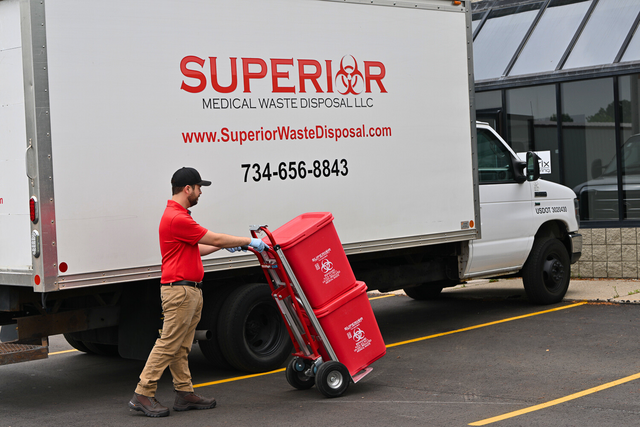A lot goes into creating a safe healthcare environment. This includes proper medical waste disposal, which is a must for ensuring patient safety and general industry compliance.
Medical waste management in healthcare encompasses a couple of things. For starters, you need to make sure that there is a separate container for hazardous waste items such as needles and sterilants. You also need to have a system in place for transporting and disposing of this and other types of waste.
For most healthcare facilities, medical waste management is a big job with lots of moving parts. It’s also well worth the effort in many ways, with a variety of benefits that highlight just how important proper medical and pharmaceutical waste disposal really is.
Below, we’re covering exactly what these benefits are, plus tips for disposing of hazardous waste at your medical facility.
4 Benefits of Properly Handling Healthcare Medical Waste
Correctly disposing of waste should be a top priority, whether you’re running a small clinic, a massive university hospital, or anything in between. Here’s why.
1. Regulatory Compliance
There are compliance standards around most things in healthcare, from how you staff your practice to how you store needles and other sharps. And among these standards are plenty of rules and regulations related to medical waste management. Taking steps to ensure proper healthcare medical waste protocols keeps you a step ahead of compliance requirements – and helps you avoid fines and other consequences of failing to do so.
2. Safety and Quality of Care
A patient may not understand the safety offered by a designated sharps container or a well-run pharmaceutical waste disposal program, but those in the field definitely do. Effective medical waste disposal practices protect health and safety by reducing the risk of injury or infection on site. They also speak to wider care practices and a healthcare facility’s commitment to doing right by their patients and employees.
3. Cost and Procedural Efficiency
Separating hazardous waste like needles and chemicals means you don’t waste money on unnecessary specialty disposal of general municipal waste. It also guarantees that all medical waste is disposed of in the most complete and compliant manner.
4. Reduced Environmental Impact
Improper handling of hazardous waste – for example, rinsing pharmaceutical waste down the drain – has a major negative impact on our environment. When you stick to best practices of medical waste management, you mitigate this risk and do your part to keep toxins out of surface and drinking waters.
How to Dispose of Medical Waste the Right Way
There are three steps to medical waste disposal:
- Segregation
- Transportation
- Treatment and Disposal
Segregation means having containers available for the storage of different types of items. Examples include a red container for needles and other sharps and a blue container for non-hazardous pharmaceutical waste. This keeps items safely stored away and makes it easy to get them sorted to the right place.
Transportation includes the containers waste is shipped in, as well as packaging and labeling requirements set out by the Department of Transportation.
Finally, treatment and disposal refers to how medical waste is destroyed or otherwise disposed of. This should be managed by a third-party medical waste disposal company, and must adhere to state and local compliance standards.
Work with One of Michigan’s Top Medical Waste Disposal Companies
Don’t let proper disposal of medical waste fall by the wayside. Contact us to learn about our safe and comprehensive medical waste disposal services, and get a trusted partner in keeping your facility, your community, and the environment as safe and clean as possible.
